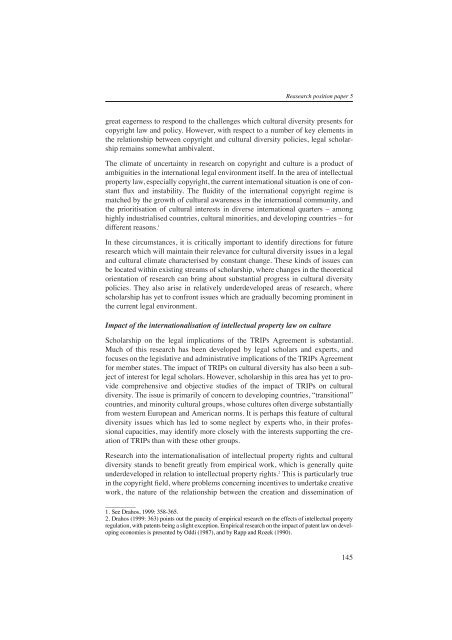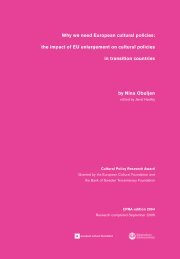Tony Bennett, Differing diversities - Council of Europe
Tony Bennett, Differing diversities - Council of Europe
Tony Bennett, Differing diversities - Council of Europe
You also want an ePaper? Increase the reach of your titles
YUMPU automatically turns print PDFs into web optimized ePapers that Google loves.
Reasearch position paper 5great eagerness to respond to the challenges which cultural diversity presents forcopyright law and policy. However, with respect to a number <strong>of</strong> key elements inthe relationship between copyright and cultural diversity policies, legal scholarshipremains somewhat ambivalent.The climate <strong>of</strong> uncertainty in research on copyright and culture is a product <strong>of</strong>ambiguities in the international legal environment itself. In the area <strong>of</strong> intellectualproperty law, especially copyright, the current international situation is one <strong>of</strong> constantflux and instability. The fluidity <strong>of</strong> the international copyright regime ismatched by the growth <strong>of</strong> cultural awareness in the international community, andthe prioritisation <strong>of</strong> cultural interests in diverse international quarters – amonghighly industrialised countries, cultural minorities, and developing countries – fordifferent reasons. 1In these circumstances, it is critically important to identify directions for futureresearch which will maintain their relevance for cultural diversity issues in a legaland cultural climate characterised by constant change. These kinds <strong>of</strong> issues canbe located within existing streams <strong>of</strong> scholarship, where changes in the theoreticalorientation <strong>of</strong> research can bring about substantial progress in cultural diversitypolicies. They also arise in relatively underdeveloped areas <strong>of</strong> research, wherescholarship has yet to confront issues which are gradually becoming prominent inthe current legal environment.Impact <strong>of</strong> the internationalisation <strong>of</strong> intellectual property law on cultureScholarship on the legal implications <strong>of</strong> the TRIPs Agreement is substantial.Much <strong>of</strong> this research has been developed by legal scholars and experts, andfocuses on the legislative and administrative implications <strong>of</strong> the TRIPs Agreementfor member states. The impact <strong>of</strong> TRIPs on cultural diversity has also been a subject<strong>of</strong> interest for legal scholars. However, scholarship in this area has yet to providecomprehensive and objective studies <strong>of</strong> the impact <strong>of</strong> TRIPs on culturaldiversity. The issue is primarily <strong>of</strong> concern to developing countries, “transitional”countries, and minority cultural groups, whose cultures <strong>of</strong>ten diverge substantiallyfrom western <strong>Europe</strong>an and American norms. It is perhaps this feature <strong>of</strong> culturaldiversity issues which has led to some neglect by experts who, in their pr<strong>of</strong>essionalcapacities, may identify more closely with the interests supporting the creation<strong>of</strong> TRIPs than with these other groups.Research into the internationalisation <strong>of</strong> intellectual property rights and culturaldiversity stands to benefit greatly from empirical work, which is generally quiteunderdeveloped in relation to intellectual property rights. 2 This is particularly truein the copyright field, where problems concerning incentives to undertake creativework, the nature <strong>of</strong> the relationship between the creation and dissemination <strong>of</strong>__________1. See Drahos, 1999: 358-365.2. Drahos (1999: 363) points out the paucity <strong>of</strong> empirical research on the effects <strong>of</strong> intellectual propertyregulation, with patents being a slight exception. Empirical research on the impact <strong>of</strong> patent law on developingeconomies is presented by Oddi (1987), and by Rapp and Rozek (1990).145














